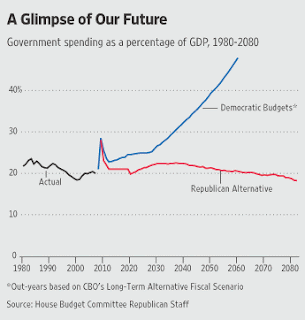
Paul Ryan and Eric Cantor are two of the most exciting neo-supply siders that are currently in the Republican minority. As this editorial from the Wall Street Journal states http://online.wsj.com/article/SB123854083982575457.html
- Deficits/Debt. The Republican budget achieves lower deficits than the Democratic plan in every year, and by 2019 yields half the deficit proposed by the president. By doing so, we control government debt: Under our plan, debt held by the public is $3.6 trillion less during the budget period.
- Spending. Our budget gives priority to national defense and veterans' health care. We freeze all other discretionary spending for five years, allowing it to grow modestly after that. We also place all spending under a statutory spending cap backed up by tough budget enforcement.
- Energy. Our budget lays a firm foundation to position the U.S. to meet three important strategic energy goals: reducing U.S. dependence on foreign oil, deploying more clean and renewable energy sources free of greenhouse gas, and supporting economic growth. We do these things by rejecting the president's cap-and-trade scheme, by opening exploration on our nation's oil and gas fields, and by investing the proceeds in a new clean energy trust fund, infrastructure and further deficit reduction.
- Entitlements. Our budget also takes steps toward fulfilling the mission of health and retirement security, in part by making these programs fiscally sustainable. The budget moves toward making quality health care affordable and accessible to all Americans by strengthening the relationship between patients and their doctors, not the dictates of government bureaucrats. We preserve the existing Medicare program for all those 55 or older; and then, to make the program sustainable and dependable, those 54 and younger will enter a Medicare program reformed to work like the health plan members of Congress and federal employees now enjoy. Starting in 2021, seniors would receive a premium support payment equal to 100% of the Medicare benefit on average. This would be income related, so low-income seniors receive extra support, and high-income seniors receive support relative to their incomes -- along the same lines as the president's Medicare Part D proposal.
We strengthen the Medicaid safety net by converting the federal share of Medicaid payments into an allotment tailored for each state's low-income population. This will enhance state flexibility and sensitivity to spending growth.
In one of the most valued government programs -- Social Security -- our budget begins to develop a bipartisan solution to the program's pending bankruptcy by incorporating some of the reforms advocated by the president's budget director. Specifically, we provide for a trigger that would make small adjustments in the benefits for higher-income beneficiaries if the Social Security Administration determines the Social Security Trust Fund cannot meet its obligations. This is a modest but serious proposal which would not affect those in or near retirement, but is aimed at helping develop a consensus, across party lines, toward saving this important retirement program. We also assure that benefits for lower-income recipients are large enough to keep them out of poverty.
- Tax Reform. Our budget does not raise taxes, and makes permanent the 2001 and 2003 tax laws. In fact, we cut taxes and reform the tax system. Individuals can choose to pay their federal taxes under the existing code, or move to a highly simplified system that fits on a post card, with few deductions and two rates. Specifically, couples pay 10% on their first $100,000 in income (singles on $50,000) and 25% above that. Capital gains and dividends are taxed at 15%, and the death tax is repealed. The proposal includes generous standard and personal exemptions such that a family of four earning $39,000 would not pay tax on that amount. In an effort to revive peoples' lost savings, and to create an incentive for risk-taking and investment, the budget repeals the capital gains tax through 2010 for all taxpayers.
On the business side, the budget permanently cuts the uncompetitive corporate income tax rate -- currently the second highest in the industrialized world -- to 25%. This puts American companies in a better position to lead in the global economy, promotes jobs here at home, and strengthens worker paychecks.
We hope the administration and Democratic leaders in Congress do not distort and preach fear about our Republican plan. Some may be tempted to appeal to the darker emotions of envy and insecurity that surely run high in times like these. Yet we know Americans are stronger, smarter and prouder than this ploy assumes.
This editorial could have appeared in the WSJ or National Review in 1976. What excites me the most is tax reform. Milton Friedman used to say that people(capital) vote with their feet. I can see Paul Ryan sitting around with Art Laffer and, my man, Larry Kudlow talking incentives and how to stimulate real Growth. The one thing that I think that Representative Ryan also could have proposed is a negative income tax to go along with a flat tax. http://en.wikipedia.org/wiki/Negative_income_tax
This is a debate that we can win




Lovely graph. I just wish I could buy into projections more than 18 months out, if THEN.
ReplyDeleteThe issue is that we are still going to double the deficit with the Republican plan. Of course with the looming entitlement boom from the boomers, that is to be expected.
ReplyDelete